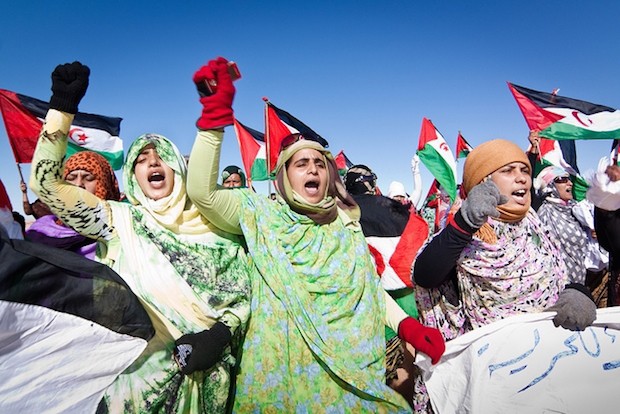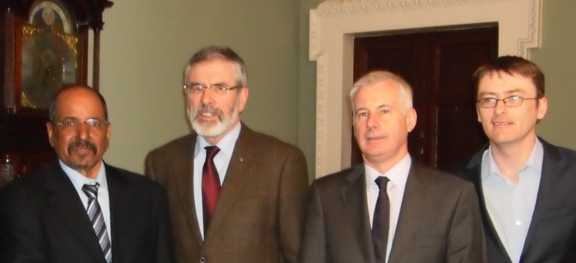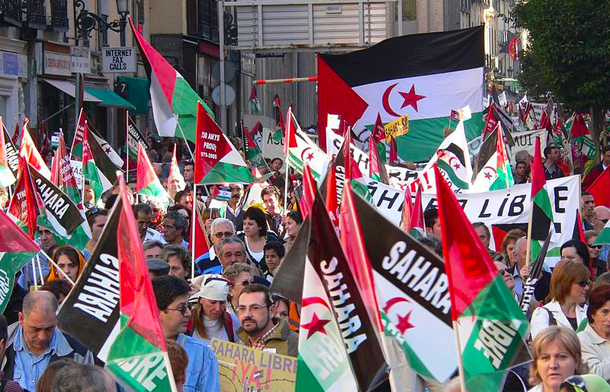1 June 2017
Western Sahara – European Commission ‘ignoring’ of UN-recognised Polisario Front on EU-Morocco Agreement raised in Dáil

● Western Sahara is occupied by Morocco
European Court of Justice annulled the EU-Morocco Agreement only six months ago because it illegally applied to Western Sahara
A EUROPEAN COMMISSION move to renegotiate its Association Agreement with Morocco on trade, political co-operation and development issues without involving the people of Western Sahara and their UN-recognised political representatives, the Polisario Front, has been raised in the Dáil (Irish Parliament) by Sinn Féin TD Seán Crowe with the Irish Foreign Affairs Minister.
Morocco has occupied much of resource-rich Western Sahara since 1975. Most of the population has been expelled by force, many to camps in the Algerian desert where 165,000 refugees still live. United Nations resolutions have called for the right to self-determination of the Saharawi people. The United Nations considers the Polisario Front to be the legitimate representative of the Sahrawi people. (See more below)

Deputy Seán Crowe (pictured) reminded the Irish Parliament on Tuesday:
“In a landmark judgment on 21 December 2016 (Polisario v Council), the European Court of Justice annulled the EU-Morocco Agreement because it illegally applied to Western Sahara.”
He added:
“Western Sahara is occupied by Morocco and no state officially recognises Morocco’s claimed sovereignty over Western Sahara.
“The ECJ ruling made clear that the European Commission cannot make agreements with Morocco that relate to Western Sahara without gaining the consent of the people of Western Sahara.
“It now seems that the European Commission is trying to renegotiate the agreement that was annulled by the ECJ exclusively with Morocco.
“This ignores the mandate of the exclusive, legitimate and UN-recognised representative of the people of Western Sahara, the Polisario Front.”

● Saharawi Republic President Mohamed Abdelaziz (who died last year) meets Sinn Féin TDs Gerry Adams, Seán Crowe and David Cullinane during an official visit to Ireland in 2012
Deputy Crowe told An Phoblacht:
“I raised this issue with the Foreign Affairs Minister in Dublin today and questioned what safeguards the Irish Government is demanding from the European Commission to ensure that the negotiations are in full conformity ECJ ruling.”
He said he also called on the Irish Government to block any attempts by the European Commission to negotiate exclusively with Morocco.
“The Irish Government must ensure that the landmark ruling by the ECJ on Western Sahara is respected and it must oppose any attempts to undermine the fundamental rights of the Sahrawi people,” the Sinn Féin deputy said.
Where is Western Sahara?

WESTERN SAHARA is located on the north-west coast of Africa bordered by Morocco, Mauritania and Algeria. The colonial administration of Western Sahara by Spain ended in 1976.
The Popular Front for the Liberation of the Saguia al-Hamra and the Rio del Oro is called Polisario, based on its Spanish acronym.
Polisario has been the unified voice of the Saharawi movement for independence and statehood since 1973.
Polisario’s armed struggle began in 1975 “after Spain ceded its phosphate-, fish- and possibly oil-rich colony to Morocco in a secretive and illegal deal”, says the global justice magazine New Internationalist.
Polisario declared independence as the Saharawi Arab Democratic Republic in 1976 and is now recognised by many governments and is a full member of the African Union.
Many Saharawi fled repression by Moroccan occupation forces to seek refuge in camps in Algeria.
In 1991, the UN brokered a ceasefire, promising to hold an independence referendum. Such a vote was proposed in the 1970s, when the international community agreed that Morocco holds no historical right to the territory, but the sides have been unable to agree on a list of eligible voters.

Follow us on Facebook
An Phoblacht on Twitter
Uncomfortable Conversations

An initiative for dialogue
for reconciliation
— — — — — — —
Contributions from key figures in the churches, academia and wider civic society as well as senior republican figures





